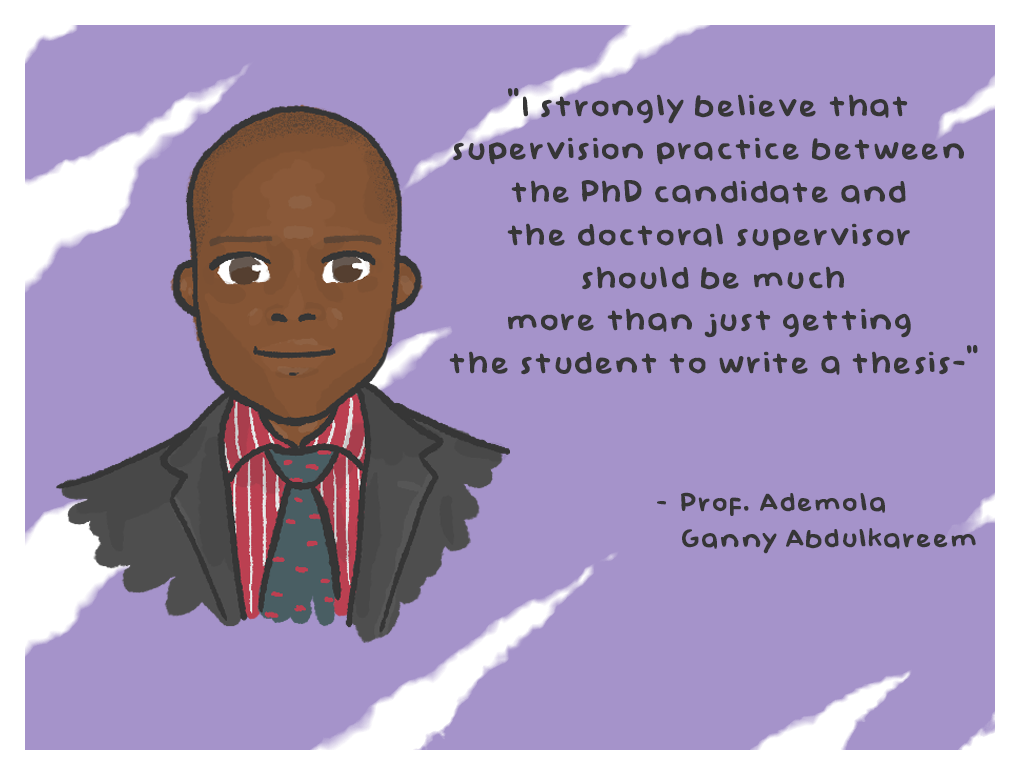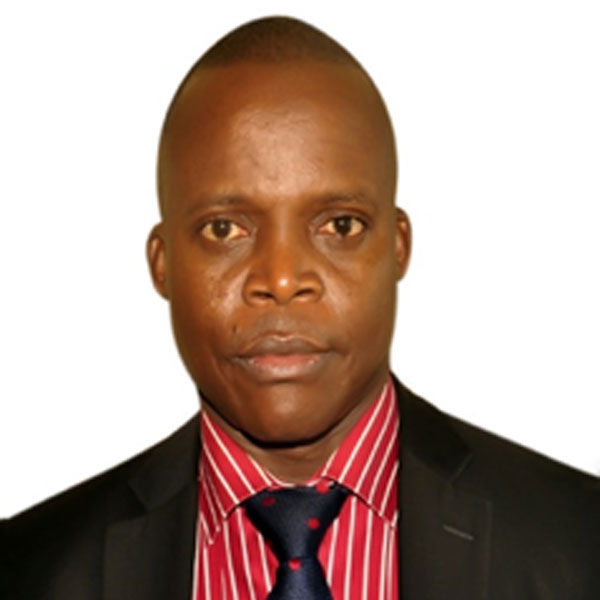Ademola Ganny Abdulkareem provides a comprehensive plan for a successful doctoral school that outlines the responsibilities and best practices for students, supervisors as well as for academic institutions/universities. He envisions an academic culture that robustly supports the students from varied backgrounds and contexts as well as supervisors with diverse interests and expertise.
Reflecting on my Academic milestones: a Journey of Self-Determination
As a Nigerian, I have witnessed numerous challenges within our universities, including an ongoing existential crisis that affects the education system. Upon completing my degree in Electrical and Electronic Engineering, I spent twelve years in the manufacturing industry, ultimately becoming a Factory Manager. However, I came to realize that there was a significant gap between the theoretical knowledge I had acquired and the practical applications in factory machines and equipment. Therefore, I started my master’s program after twelve years of graduation and graduated three years after from the University of Lagos, Nigeria. During my master’s program, I gained valuable insights into topics related to industrial machines, including dynamic modelling of electrical machines, advanced electric power systems, power system stability techniques, as well as modeling, simulation, and control. I remember I quickly developed a close friendship with a few smart classmates who were also going through the master’s program with me. Finally graduated with a master’s degree in Electrical and Electronic Engineering with a PhD grade. Undoubtedly driven by self-determination and a profound passion for knowledge, I embarked on a PhD journey, motivated by my desire to contribute to academics. Moreover, undertaking a PhD study allows one to be passionate and curious in terms of research output, publications, and in many cases solving a critical problem. While obtaining a PhD may be considered the epitome of academic achievement that symbolizes years of rigorous research, dedication, and perseverance, the journey to earn this highest level of degree is unpleasant.
Personal Experience and the Challenges as a Doctoral Student and a Lecturer.
I finished my master’s program in the year 2008 and got employment with Covenant University, Nigeria, in September 2009 as a lecturer, which was a new area of expertise. The Engineer formerly with “Spanner” is now transformed into a permanent lecturer role. This was a “different ball game” entirely! I was honoured with the appointment as a Lecturer II at Covenant University as a chartered engineer, with the Council of Registered Engineers of Nigeria (COREN), with the condition to swiftly commence my PhD program immediately. So, I started my PhD program with the same institution in January 2010, the beginning of new challenges and new beginnings as a doctoral student and lecturer. The institution was relatively new when I joined but well equipped with modern adequate facilities and infrastructures for doctoral students and the lecturers but with few Senior lecturers and Professors who were experts in my field. The delay in the PhD program poses a significant concern, especially given the binding nature of the institution’s bond scholarship program. The bond can be paid in either monetary form or serve the system back with double the number of years spent on the PhD program. Looking back at the lack of study time due to the pressure of workload (e.g., course allocation, undergraduate project supervision, administrative work, etc.) at my disposal serves as another source of discomfort to be addressed to avoid delay or dropping out of the doctoral program.
The first of my challenges started with the coursework that was supposed to be completed within a year but took me two years and four months. I would have even finished exactly two years, but the professor undertaking one of my courses died along the journey of my PhD program. Again, the problem of supervisor allocation matters, and getting a supervisor in my area of research (electrical and electronics) came up. I had to source an expert from the University where I did my master’s program, while a senior lecturer who is majoring in communication was assigned to me as a co-supervisor. Even my main expert supervisor (professor) was about 80km away from my institution, and the in-house co-supervisor, a communication expert, could not assist in the area of research gap that I identified by myself. Confronted with a scarcity of expertise in my field within my institution and the overwhelming workload as a doctoral student, I found myself in a challenging and isolating situation.
Having identified a gap immediately, I embarked on a personal quest to find a research topic that was not imposed on me and became addicted to my research study and carried on my lecturer role simultaneously. Eventually, I found myself separated from my family and friends, experiencing a deep sense of loneliness. At a point, my wife suggested a trade-off between them and my research study. Despite this, I became determined and forged ahead with my research work, discovering new truths in the research area with quality publications in highly reputable Journals (SCOPUS, Web of Science, etc.) to show for the study. In addition, I was promoted to the position of lecturer 1 based on the number and quality of publications from my research study. It is worth mentioning here that my doctoral journey was full of obstacles; however, my colleagues pursuing similar doctoral programs not only in Covenant University but also in Nigeria as a whole, stay longer in the program, ranging between eight to fifteen years, and many even drop out or give up. Truly, tough times never last, but tough people do.. Through persistent effort and determination, I finally completed my PhD program in March 2016. This is relatively the shortest period as compared with my colleagues I met pursuing the same doctoral program at Covenant University, and this could be partly ascribed to my industry experience and self-determination. Immediately after I earned my Doctor of Philosophy (PhD) in Electrical and Electronics Engineering, I was promoted to the position of Senior Lecturer at Covenant University, a PhD supervisor position, marking a significant milestone in my academic career.
Strategies and Techniques That Aided My Successful PhD Completion
In this column, I share my personal experiences as a PhD student and also as a doctoral supervisor, exploring how my humanity makes me a stronger supervisor. Based on my experience as a doctoral student, there is no doubt that postgraduate study is a challenge to many students, and the challenge becomes even harder when students in postgraduate programs do not have effective supervisor support in their various research studies. In addition to the dissatisfaction with the teaching tasks, PhD course workload is being faced by many in the Nigerian postgraduate education system, where doctoral scholarship is inaccessible.
I strongly believe that supervision practice between the PhD candidate and the doctoral supervisor should be much more than just getting the student to write a thesis as is practised in Nigerian doctoral supervision. Yes, I considered everything my supervisor said and attended to their suggestions about revisions to my work as a doctoral candidate, but I also believe in my style of writing. I remember paying attention to the work of novelists; I enjoy reading paper articles, and chapter books that result from research studies. It may seem that the supervisor’s style has nothing to do with the student’s field of research, but this does not matter because the doctoral student can still absorb something on how to write a quality thesis. One basic approach I developed is to read and read some more. ! In addition to the topical area of research study identified by me, I was exposed to reviewing a wide range of literature that provides opportunities to develop ideas and approaches to investigation.
Shortly after my promotion as a senior academic, I had the privilege of supervising my first doctoral student in my field of expertise in 2018. His journey was shaped by both my professional and personal advice, ensuring a prompt and quality PhD study outcome. Opportunities for the practical application of strategies that involve motivation, curiosity, self-determination, and persistence that are required for a successful academic journey were offered to ensure prompt PhD education for my student. Immediately, I requested from my doctoral student more than fifty IEEE Journal-reviewed relevant studies in his topical area of interest. This provided me with an in-depth study to identify the gap in knowledge that can be addressed in my students’ research, thereby serving the critical purpose of contributing to the body of knowledge for the discipline.
Meanwhile, there is a perfect fit in the area of research interest between my doctoral student and me, as the research advisor. Identifying a research supervisor who is an expert researcher in an area of interest that is closely aligned with student interest is important to PhD success. If the advisor is an expert in the research topic, he or she will be able to guide PhD students more effectively and efficiently. Without this kind of expert guidance, one will make mistakes that could have been avoided, as experienced during my PhD.
Let me share how my supervision has transformed other postgraduate (PG) students in my institution. At some point, our student-supervisor relationship went beyond academic guidance with my students; it involved understanding and addressing the unique context in which they are studying, including mentoring, feedback, and financial and family pressures based on the gained experience. Eventually, my first PG student earned his master’s degree in 2018 with a distinction grade. Upon completion of my first master’s student, I was given another master’s candidate, and on the 20th of September 2018, the senate approved my appointment as co-supervisor of the PhD thesis of a doctoral candidate in my field of expertise, as narrated before. It may interest the readers that I completed the supervision of five (5) master candidates between 2016 and 2022, and my first PhD candidate was also in 2022. The research focus of my doctoral student won a total fellowship of R250,000 for a postdoctoral research fellowship at Tshwane University of Technology, South Africa. Currently, as an Associate Professor, promoted in 2020, I was allocated as a supervisor to another PhD candidate in 2022.

All other quality achievements of successful completion of my PhD students within the time plan are based on the acquired experience (as a doctoral student), and personal self-development in local and international training. In addition to the comprehensive support provided by my institution, including training, publication funds, industry partnerships, and workshops, I proactively engaged in continuous personal development. For instance, I single-handedly paid the sum of five thousand Rands (R5000) for the DIES/CREST Online training course for supervisors of doctoral candidates at African Universities that is packaged with relevant topics needed for effective quality of doctoral supervision in Nigeria and even beyond. In addition to focusing on the research itself, I extended support to the well-being of my postgraduate students by drawing on my own experiences in certain situations. However, it is crucial to identify the various factors within academics that effectively support the well-being of doctoral students. Nevertheless, with the right strategies, practice, and feedback, we can continuously improve on everything.
Undoubtedly also, my industry experience, and ability to relate theoretical information with practical ones, especially in my field of expertise (Electrical and Electronics Engineering) is a compelling alternative work, offering lucrative opportunities and practical applications of doctoral research supervision.
Recommended Pathway for a Successful PhD Journey
To produce quality doctoral candidates, devoid of delay, and enough quality doctoral supervisors to meet the increasing numbers of postgraduate programs, the following recommendations are highlighted.
- Structures like the postgraduate school (for the whole university), Faculty / School-based postgraduate departments should be strengthened to support the students in their academic journey as well as to encourage an atmosphere of patience, understanding, and mentorship.
- It is important to create a supportive environment that allows doctoral supervisors to explore their own paths and provides guidance as they navigate the complexities of their research journey. It is essential to foster an atmosphere of adequate training and research through seminars and workshops for doctoral students.
- Doctoral supervisors to undertake high-quality research topics that can secure grant funding and research partnership opportunities with industries. Doctoral students should select project topics closely related to their supervisor’s research area to prevent intellectual isolation and become more comfortable in areas of topical interest.
- Provide or allocate supervisors who develop their research expertise within the research topic area of the doctoral candidates so that the supervisor can provide the necessary help. Where this becomes inevitable, the Institution should source international Visiting Scholars (IVR) who are experts in the same area of research interest.
- Your institution will likely have faculty who are scholars in their respective fields. Although these faculty members may teach courses outside your field of interest, to reduce the workload for doctoral students who are also lecturers.
- We should engage in practice cluster supervision and Co-Supervision as it benefits both the students and supervisors. With this model, the breakdown in communication between supervisor and student is easily managed or resolved, and accountability, particularly in terms of the supervision provided, is equally unveiled.
- Organizing academic seminars may be fortnightly, where students can present their work. The idea of “Doctoral Weeks” and “Summer Schools” can be borrowed as some of the best practices.
- Articulate a clear research problem and devise suitable methods by cultivating critical reasoning skills. One way to help students cross this threshold is to guide them through a review paper process and group presentations. In our university, there are weekly seminars for students to present their progress. The forum allows students to get feedback and fine-tune their ideas or relook at their results. It is a supportive setting, even for the supervisors.
- Encourage the student to join a team of doctoral students, possibly in a postgraduate school or within the faculty or department, to share some experiences and knowledge. through close discussions and oral presentations with other students to tackle the standard conceptual threshold.
- Build up social Interaction among students. Loneliness due to lack of social interaction may be expressed mostly by international students or students with remote offices or learning chambers.
- Structure one-on-one interviews rather than written feedback alone, and comment on early drafts of the doctoral research process in detail to identify problems and set standards.
In conclusion, the author shared his personal experience with unique specific challenges during his PhD journey, and how he overcame those challenges. The author imparts comprehensive knowledge and supervisory experiences, elucidating various facets of the supervisor-supervisee relationship and the delicate balance between engagement and delineation within the realm of successful doctoral education

Prof. Ademola Ganny Abdulkareem
Department of Electrical and Power Industry, Covenant University, Ota, Nigeria


